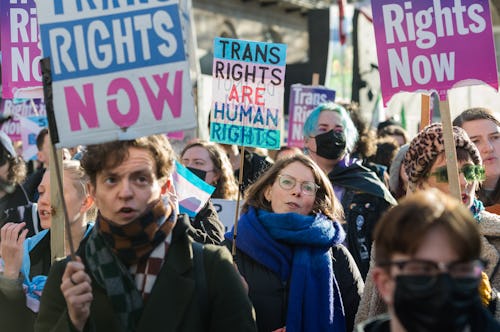Politics
The LGBTQ+ Action Plan For Wales, Explained
And the UK government’s reaction.

In January 2023, the UK government blocked Scotland’s Gender Reform Bill. Drafted to improve the system for trans people in Scotland to legally change their gender, it would have removed the need for a medical diagnosis, and lowered the age to apply for a Gender Recognition Certificate (GRC) from 18 to 16. While Scotland is a devolved government, the UK government has the “power to intervene in certain cases” under Section 35 of the Scotland Act 1998. According to British Secretary of State for Scotland Alister Jack, Scotland’s Gender Reform Bill would have a “significant impact” on other equality laws within the UK. Now, the Welsh government is proposing an LGBTQ+ Action Plan that includes gender reform to make it simpler for someone to legally change their gender, prompting the UK to respond, stating that “there are no plans to reform the Gender Recognition Act in England and Wales.” But what is the LGBTQ+ Action Plan For Wales and what is happening with gender reform in the UK? Here’s what you need to know.
What Does The LGBTQ+ Action Plan For Wales Consist Of?
The LGBTQ+ Action Plan For Wales has been developed in collaboration with a “wide range of communities and organisations across all parts of Wales,” as Deputy Minister for Social Partnership Hannah Blythyn MS explained. The plan itself will “act as a framework for LGBTQ+ policy development across government” and will “set out the concrete steps we will take to strengthen equality for LGBTQ+ people, to challenge discrimination, and to create a society where LGBTQ+ people are safe to live and love authentically, openly and freely as themselves.”
There are 46 actions in the proposed plan, including a ban on conversion therapy and more support in place for LGBTQ+ people reporting hate crimes. In terms of gender reform, the LGBTQ+ Action Plan for Wales aims to “seek the devolution of powers in relation to Gender Recognition,” “provide recognition of non-binary and intersex people,” and “review the Gender Identity Development pathway for young people” while continuing to develop the Wales Gender Service by improving “the data recording and change processes for maintaining trans, non-binary and intersex people’s medical records.”
To seek devolution powers, the Welsh Government’s Equality and Human Rights Division will negotiate with the UK government and “trigger a request to devolve powers related to Gender Recognition” while simultaneously identifying ways “to support Gender Recognition Certificate (GRC) applicants in Wales.
How Does It Compare To Scotland’s Gender Recognition Bill?
The Scottish Gender Recognition Reform Bill would have allowed trans people in Scotland to legally obtain a GRC without needing a medical diagnosis while lowering the age from 18 to 16. In contrast, the LGBTQ+ Action Plan For Wales is a broad set of proposed actions that focus on other essential issues and gender reform. Wales wants to “seek the devolution of powers in relation to Gender Recognition” to avoid the UK government from banning what they want to propose, as they did with Scotland.
How Has The Welsh & UK Government Reacted?
Described by the country’s First Minister Mark Drakeford as “a powerful statement” that will “focus on responding to the specific needs, diversity, and vulnerabilities for our LGBTQ+ communities,” a spokesperson for the UK Government said that like Scotland, there will be no gender reform in Wales.
“We share the concerns that others have set out with proposed reforms to the GRC application process, particularly around safety issues for women and children. As a result of this, there are no plans to reform the Gender Recognition Act in England and Wales.”
In contrast, the Welsh Conservative Shadow Minister for Equalities, Altaf Hussain MS, said, “the further devolution of powers is not the answer” to support trans people in Wales. Referring to the “chaos that the SNP have brought about with devolved powers,” Hussain said “members of the LGBTQ+ community deserve our respect, support, and understanding, they don’t deserve to be used as a political tool by Labour ministers in their bid to secure more powers.”